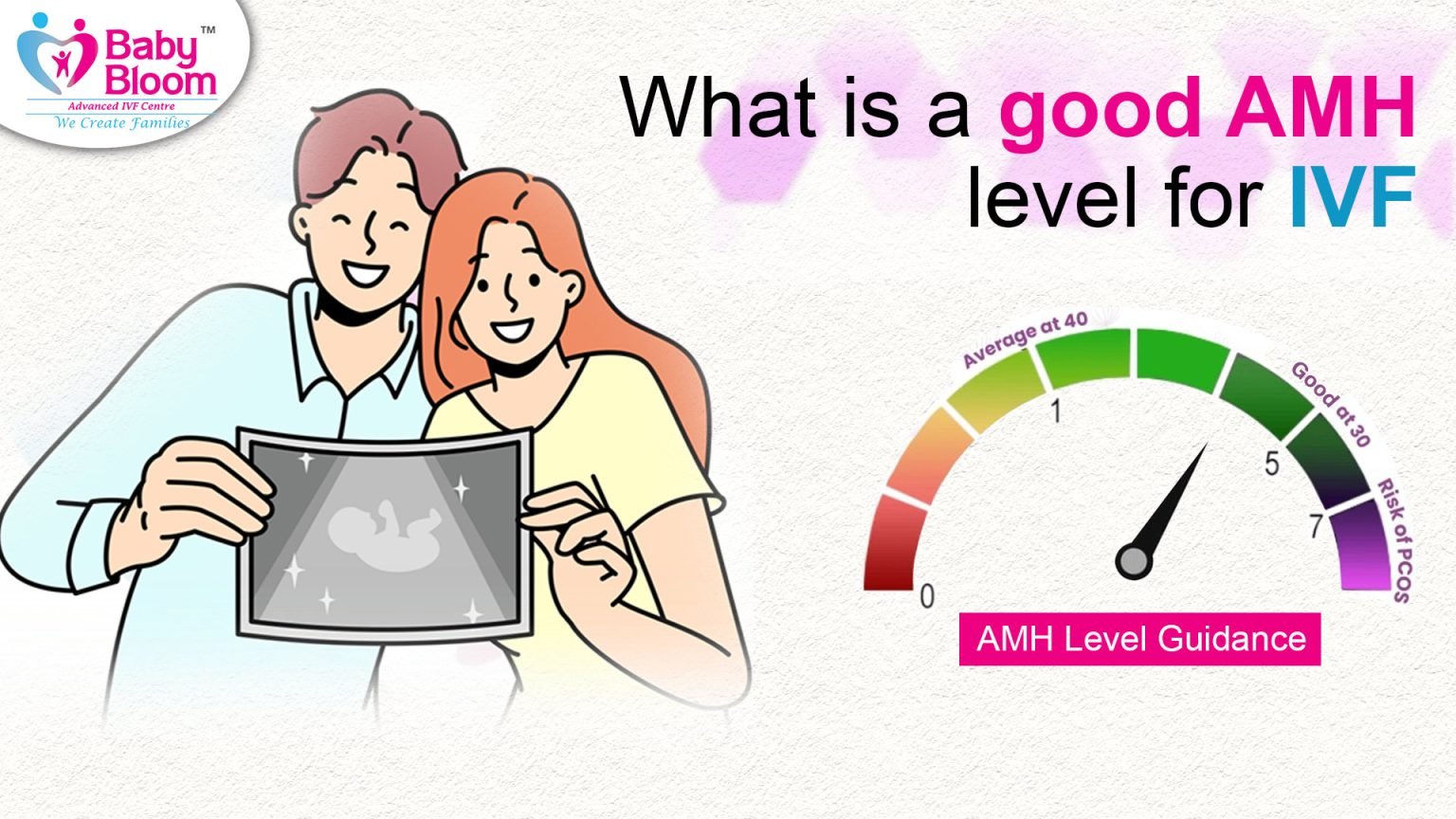Understanding AMH Levels and Their Importance in IVF Treatment

Dr. Pujil Gulati, IVF Specialist with over 13 years of experience in Assisted Reproductive Techniques BabyBloom IVF Gurgaon
Anti-Mullerian Hormone (AMH) is a hormone produced by the granulosa cells in the ovarian follicles. It plays a vital role in understanding a woman’s fertility potential. A good AMH level indicates that a woman has a sufficient number of eggs, which is essential for natural conception and the success of fertility treatments like IVF (In Vitro Fertilization). In this blog, we will discuss what AMH levels mean, how they affect IVF treatment, and what can be done in cases of low AMH levels.

What is a Good AMH Level?
AMH levels help assess the number of eggs a woman has in her ovarian reserve, but it’s important to note that it does not determine egg quality. Women are born with all the eggs they will ever have, and AMH levels naturally decline with age. Here’s a breakdown of AMH levels and their impact on fertility:
High AMH Levels
- Range: 40.04 to 66.80 pmol/L (or 5.6 to 9.5 ng/mL)
- Implications: High AMH levels suggest a large ovarian reserve, which is beneficial for IVF. Women with high AMH levels typically respond well to fertility medications, resulting in the production of sufficient follicles for egg retrieval. However, high AMH levels can sometimes indicate polycystic ovary syndrome (PCOS). While PCOS may require additional management, the abundant eggs available are advantageous for fertility treatments.
Medium AMH Levels
- Range: 22.90 to 48.50 pmol/L (or 3.2 to 6.8 ng/mL)
- Implications: Medium AMH levels indicate a healthy ovarian reserve. Women with these levels have good chances of success with IVF, though other factors like age and overall health may still influence outcomes.
Low AMH Levels
- Range: Below 22.90 pmol/L (or less than 3.2 ng/mL)
- Implications: Low AMH levels suggest a reduced ovarian reserve. This can make conception more challenging, but it does not eliminate the possibility of pregnancy. Fertility experts often recommend tailored treatment plans, and in some cases, donor eggs may be an option. Women with extremely low AMH levels (e.g., below 2.1 pmol/L or 0.3 ng/mL) may face significant challenges, but success is still achievable with advanced fertility techniques and expert care.
The Role of AMH in IVF
During IVF, the goal is to stimulate the ovaries to produce multiple eggs for fertilization. A good AMH level improves the likelihood of producing enough eggs in response to fertility medications. Here’s how AMH levels impact IVF:
- High AMH Levels: Women with high AMH levels typically respond well to stimulation protocols, increasing the chances of retrieving multiple eggs. However, they may be at risk of ovarian hyperstimulation syndrome (OHSS), a condition caused by excessive ovarian response. Fertility specialists monitor such cases carefully.
- Medium AMH Levels: Women with medium AMH levels also respond well to stimulation and have good chances of success with IVF.
- Low AMH Levels: Women with low AMH levels may require higher doses of medication or alternative approaches to stimulate egg production. In some cases, using donor eggs might be recommended. Despite these challenges, many women with low AMH levels have successfully conceived with the right treatment plan.
Can You Get Pregnant with Low AMH Levels?
Yes, pregnancy is still possible even with low AMH levels. While a lower ovarian reserve may reduce the number of eggs available, other factors like egg quality, overall health, and age play a significant role in achieving pregnancy. Fertility experts may recommend:
- Customized stimulation protocols.
- Lifestyle changes to improve overall fertility.
- The use of donor eggs if natural eggs are insufficient.
Why is AMH Testing Important?
AMH testing is particularly useful for:
- Women over the age of 35 or 40, as ovarian reserves decline with age.
- Determining whether IVF is a suitable option.
- Tailoring fertility treatment plans to maximize success. Read More:- AMH Test in IVF: जानें क्यों ज़रूरी है ये टेस्ट महिलाओं के लिए
Expert IVF Treatment for All AMH Levels
At Babybloom IVF Centre Gurgaon, we provide world-class fertility treatments under the guidance of experienced specialists. Our team closely monitors AMH levels to create personalized treatment plans. Whether you have high, medium, or low AMH levels, our experts work to maximize your chances of success. We also ensure affordable and compassionate care for patients from around the world.
Conclusion:-
A good AMH level for IVF typically ranges between 1.0 and 3.0 ng/mL (7.14 to 21.42 pmol/L), indicating a healthy ovarian reserve. However, AMH is just one part of the fertility puzzle. Other factors, such as age and overall health, also influence IVF outcomes. Women with low AMH levels can still achieve pregnancy with the right medical support and treatment plan. If you are considering IVF, consult with a fertility specialist to determine the best approach for your unique situation.
Write your message:-

Social Media Links :-
Welcome to BabyBloom IVF, where your journey to parenthood is nurtured with care, expertise, and the latest advancements in fertility treatment. Located in the heart of Gurgaon, Babybloom IVF is the Best IVF Centre in Gurgaon & leading fertility center dedicated to helping couples achieve their dreams of starting or growing their families.
Contact Us
Address No.1 I, block, 189, near Baani Square, South City II, Sector 50, (Gurgaon) Gurugram, Haryana 122018
Address No.2 Babybloom IVF, Nursing Home, Civil Rd, Company Bagh, Rohtak, Haryana 124001

Brought Happiness to the world
@BabyBloom IVF All Rights Reserved @2025


